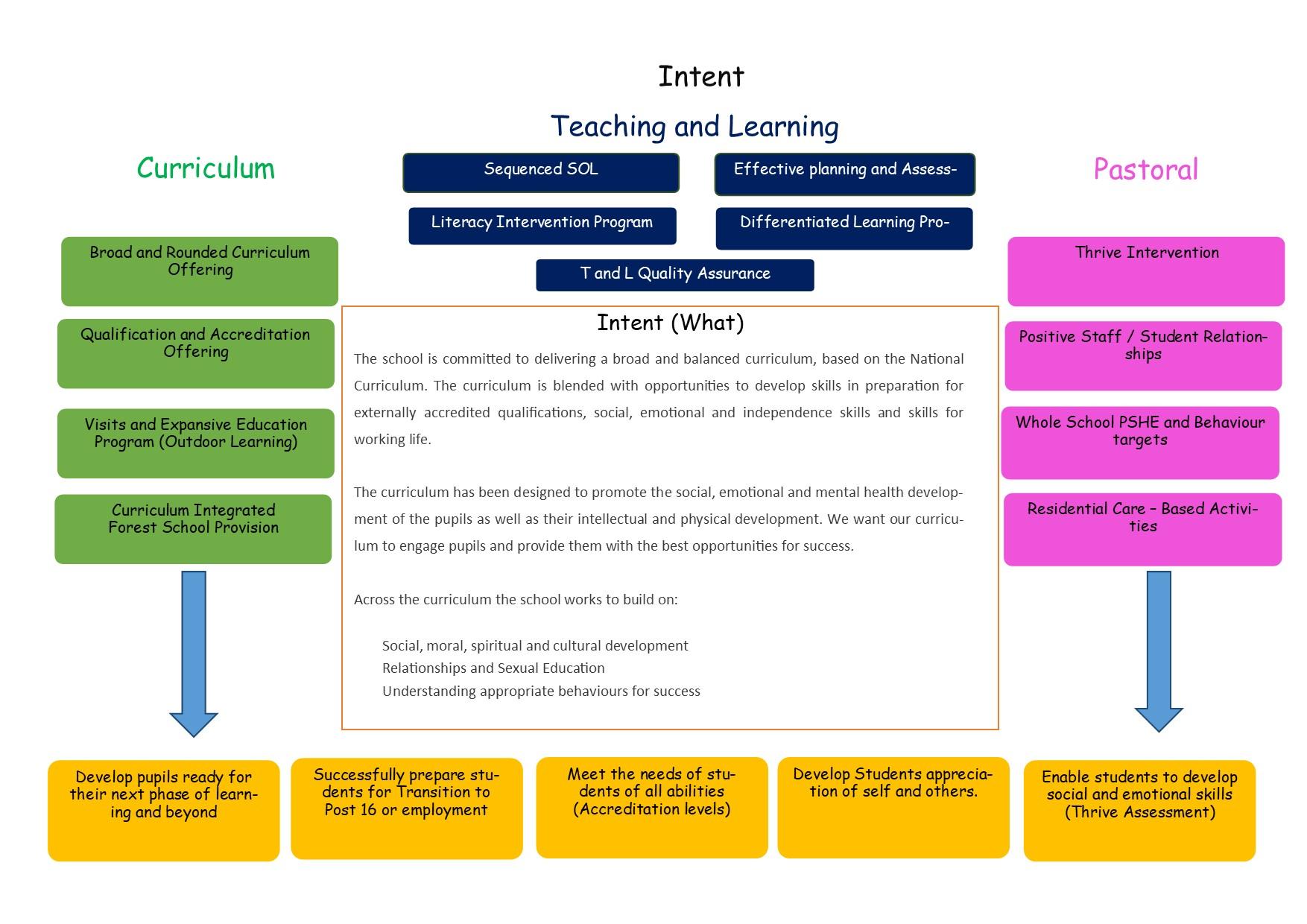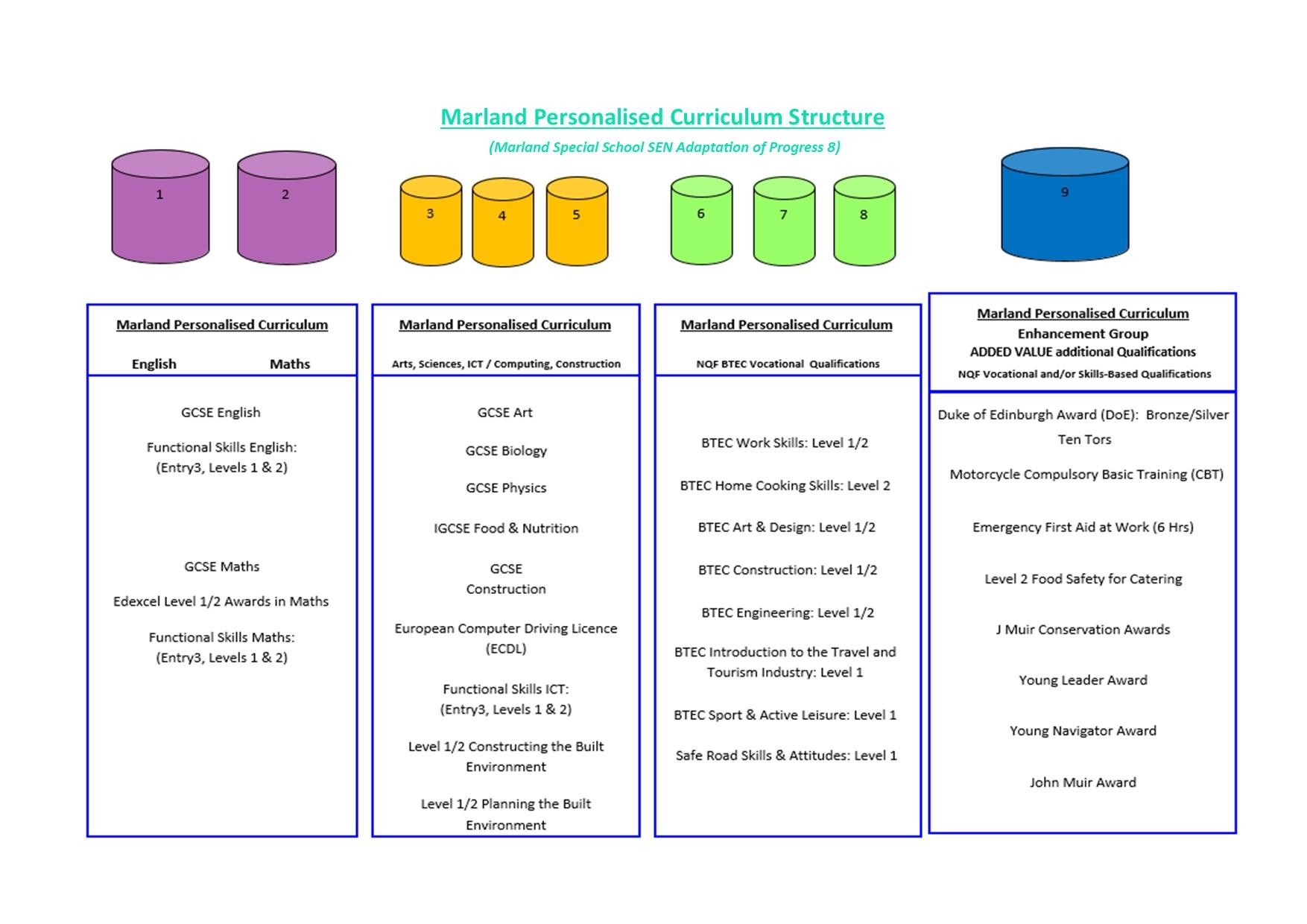Curriculum Overview

Curriculum Statement:
At Marland School, our ethos is to: build on prior learning, provide opportunities to close any gaps in attainment whilst offering real and relevant learning experiences. We support our students to develop interpersonal skills, build resilience and to leave us with the skill set required to contribute positively in the wider community and to be successful in whatever career path they choose.
Curriculum INTENT
The school is committed to delivering a broad and balanced curriculum, based on the National Curriculum. The curriculum is blended with opportunities to develop skills in preparation for externally accredited qualifications, social, emotional and independence skills and skills for working life.
The curriculum is designed to promote the social, emotional and mental health development of the pupils as well as their intellectual and physical development. We want our curriculum to engage pupils and provide them with the best opportunities for success.
Across the curriculum the school works to build on:
- Social, emotional and Mental Health (SEMH) needs.
- Relationships and Sexual Education.
- Understanding appropriate behaviours for success.
Curriculum IMPLEMENTATION
At Marland School, we are of the belief that a well implemented curriculum will provide our students with the foundation upon which to build their learning and development. The curriculum is built to provide opportunities to build on existing learning, identify any gaps in learning and prepare students for gaining relevant accreditation in line with their ability. Learning is well planned, engaging and differentiated to meet each students individualised needs.
Building knowledge is integral to our curriculum planning. Subject Leaders carefully construct a curriculum that promotes a deep understanding of a wide range of topics. Teachers plan learning using data and prior attainment information, identifying any gaps in knowledge and providing the opportunity to embed and recall learning. This provides students with the chance to build a firm foundation in preparation for the next level of their learning.
The curriculum at Marland School also works to embed a whole school approach to:
- meeting the social, emotional and mental health (SEMH) needs of our students by promoting positive behaviour in line with the school behaviour strategy and target.
- Improve understanding of positive relationship and sexual education with a whole school RSE approach.
Curriculum IMPACT
Enable students to develop social and emotional skills (Thrive Assessment) |
The Curriculum at Marland School will strive to:
- Build on prior learning and build for future progression.
- Develop pupils ready for their next phase of learning and beyond.
- Develop student’s appreciation of self and others.
- Enable students to develop social and emotional skills.
- Successfully prepare students for Transition to Post 16, employment or training.
- Enable all students to fulfil the potential.
| English | Maths | Science | IT | Hum-anities | PSHE | Art | HCS | DT | Work Skills | ODE | TOTAL | |
KS2/3 | TRA | / | / | / | / | / | 1 | 1 |
| 2 | / | 2 | 26 |
TRB | / | / | / | / | / | 1 | 1 |
| 2 | / | 2 | 26 | |
KS3 | C | 4 | 4 | 3 | 2 | 2 | 1 | 2 | 3 | 3 | / | 2 | 26 |
D | 4 | 4 | 3 | 2 | 2 | 1 | 2 | 3 | 3 | / | 4 | 26 | |
E | 4 | 4 | 3 | 2 | 1 | 1 | 2 | 3 | 3 | / | 4 | 26 | |
F | 4 | 4 | 3 | 2 | 1 | 1 | 2 | 3 | 3 | / | 4 | 26 | |
KS4 | G | 4 | 4 | 3 | 2 | 1 | 1 | 1 | 3 | 2 | 4 | / | 26 |
H | 4 | 4 | 3 | 2 | 1 | 1 | 1 | 3 | 2 | / | 4 | 26 | |
TOTAL | 24 | 24 | 18 | 12 | 14 | 14 | 12 | 18 | 20 | 4 | 20 | 208 | |
Curriculum - Overview KS3
KS3 Curriculum | Term 1 | Term 2 | Term 3 | Term 4 | Term 5 | Term 6 |
English | Boy in the Girls Bathroom - Fiction Reading Comprehension | Dracula Script - Script reading Comprehension | Non-Fiction Writing Project - Newspapers | Creative writing Project - Our world | Shakespeare Project - Macbeth/Romeo and Juliet | |
Maths | Numbers & Number systems Calculating | Checking Counting & Comparing | Visualising Properties of Shape Algebra | Exploring FDP Proportional Reasoning | FDP Properties of shapes | Revision & recap Exam Prep |
Science | Humans as Organisms | Maintenance of Life | Environment, Adaptation, Competition | Environment, Inheritance and Selection | ||
ICT | Construct/Coding project Binary | Office basics
| Internet Safety Publisher/Poster Design/Project | Digital skills Device/Hardware | Entry level focus Word/excel/email Assessment/mocks | Construct Project Game design |
Food Tech |
|
| STEM Project Engineering |
|
|
|
Art | Formal Elements in art | Natural Form | Text Graphics | 2D to 3D | Out and about, art outside | Faces, portraits. Photography & landscape |
PSHE | Being Different | Discrimination Stereotypes Multiculturalism Equality Act | Celebration success Longer term goals What makes us happy wealth / health Helping others – the benefits of it | Stress and anxiety Mental Health Health – what can we do to make us healthy? Dental health | Characteristic of a healthy relationship Friendships Emotions within friendships Online safety | Puberty and growing up The teenage brain Romantic relationships Self-image Society, changes and the impact on teenagers |
Humanities | RE: Six World Faiths | Geography: Countries Project | History: Roman Army | |||
Outdoor Learning | Learning about Water Based Environments. Surfing, wakeboarding, river swimming. | Woodland Environments, awareness of conservation issues. Bushcraft, outdoor cooking, mountain biking. | Moorland Exploration and Understanding, on Dartmoor and Exmoor. Walking, cycling, climbing, sledging. | Understanding Coastal Environments. Kayaking, walking, fishing. | Developing understanding. Revisiting different environments to reinforce and deepen understanding and safe practise. Cycling, walking, kayaking. | Water Sports Development. Developing skills and safe practise in a variety of water sports. Surfing, River Swimming, Wakeboarding. |
Curriculum - Overview KS4
KS4 Curriculum | Term 1 | Term 2 | Term 3 | Term 4 | Term 5 | Term 6 |
English | GCSE – P1 Q1-Q4 FS – Speaking + Listening | GCSE – P1 Q5 Creative Writing FS – Reading | GCSE – P2 Q1-Q4 FS Writing | GCSE – P2 Q5 Non-Fiction writing FS – Catch up | GCSE – P1+P2 Practise | Work Skills (Cont.) Application and Writing letters and emails |
Maths | Numbers & Number systems Calculating | Checking Counting & Comparing | Visualising Properties of Shape Algebra | Exploring FDP Proportional Reasoning | FDP Properties of shapes | Revision & recap Exam Prep |
Science | Ecology in Action | Variation + Evolution | Co-ordination + Control, Health and Disease | Moving + Changing material | Cells, Photosynthesis and Genetics | Revision and exam prep |
ICT | F.S – BKSB Word/Excel modules | F.S – BKSB Safety Databases File management | Internet Safety Projects F.S BKSB Personal Projects | F.S Revision/BKSB Assessments Applications/Life skills Alt Qualification TBD (Digital Skills) | ||
Food Tech | Starting Unit 2 WJEC Construction, this includes: Joinery, Electrical, Researching H & S | Completing Unit 2 WJEC Construction, this includes: Plumping, Tiling, Painting + Decorating Researching Unit 3 | Revision for U1 + U3 | New KS4 to start Engineering WJEC L1/L2 | ||
Art | Art processes | Experimentation and creating designs | GCSE Coursework – developing project work | |||
Non Examination – Personal project developing own interest and skillset | ||||||
PSHE | Being Different | Discrimination Stereotypes Multiculturalism Equality Act | Celebration success Longer term goals What makes us happy wealth / health Helping others – the benefits of it | Stress and anxiety Mental Health Health – what can we do to make us healthy? Dental health | Characteristic of a healthy relationship Friendships Emotions within friendships Online safety | Puberty and growing up The teenage brain Romantic relationships Self-image Society, changes and the impact on teenagers |
Home cooking skills | Getting ready to cook | Seasonality | Farm to fork | Economise Cooking | Nutritious Meals | |
Sport and Active leisure | Top opportunity in sport | How the body works | Physical activity and you | |||
Outdoor Learning | Learning about Water Based Environments. Surfing, wakeboarding, river swimming. | Woodland Environments, awareness of conservation issues. Bushcraft, outdoor cooking, mountain biking. | Moorland Exploration and Understanding, on Dartmoor and Exmoor. Walking, cycling, climbing, sledging. | Understanding Coastal Environments. Kayaking, walking, fishing. | Developing understanding. Revisiting different environments to reinforce and deepen understanding and safe practise. Cycling, walking, kayaking. | Water Sports Development. Developing skills and safe practise in a variety of water sports. Surfing, River Swimming, Wakeboarding. |
KS4 Courses
At Marland we endeavour to have a varied and flexible curriculum which meets the needs of the students. Due to the SEMH aspects of the students we have to offer an array of different qualifications and also levels from Entry Level 1 to GCSEs. The aim is to enable students to access the relevant qualifications which will enable them to have move onto Post-16 education.
The aim is to work on the Core of English and Mathematics and to focus on the Literacy and numeracy needs of the students. The default qualification is the Functional Skills in these subjects with many students also moving on to the GCSEs. The rest of the timetable allows the students to work to their strengths to enable them to be successful. The students will not achieve all the offered subjects but the subject which meets their own individual needs and what qualifications they need to follow their desired pathway.
Marland also has the policy of entering the students when they are ready and that is why we generally use the online version of the Functional Skills Qualifications. We will also regularly enter students early for their GCSEs to give them the necessary experience to try and alleviate their anxiety around tests and exams.

